The Top 15 U.S. Male Swimmers Before World Championship Trials
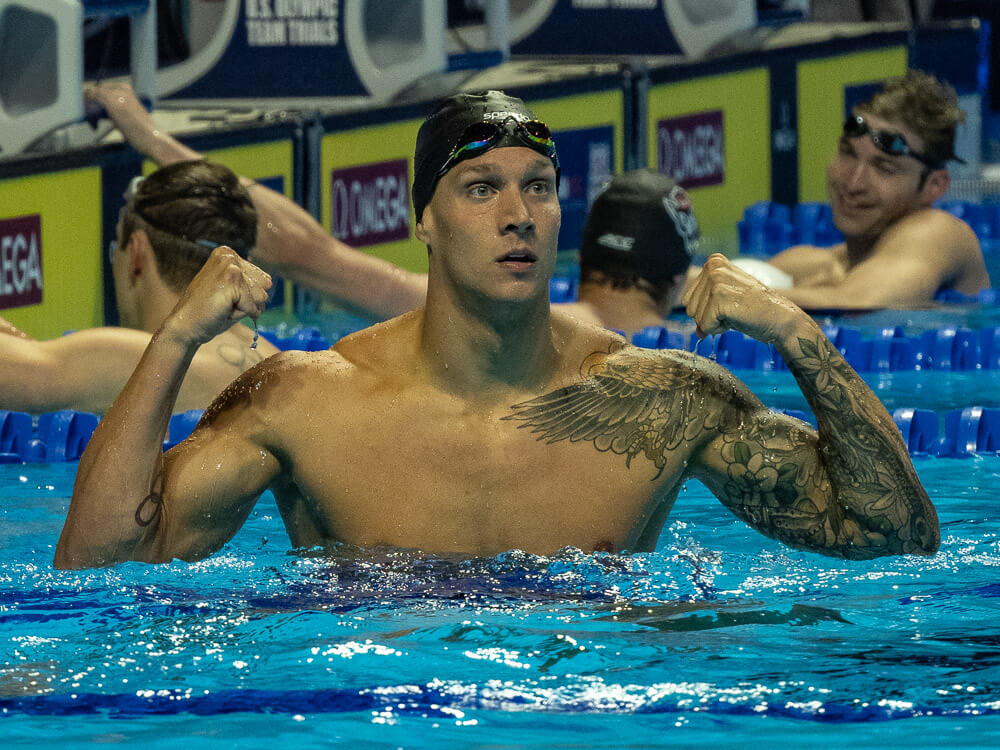
The Top 15 U.S. Male Swimmers Before World Championship Trials
It’s hard to believe it, but the U.S. Trials for this summer’s World Championships are already approaching quickly. While the top meet in the United States usually falls between mid-June and late July, this year’s meet will be held April 26-30 in Greensboro, N.C. It was originally scheduled to accommodate a late May World Championships in Fukuoka, Japan, and the dates were not changed after the Fukuoka meet was postponed to July 2023 and then a new Worlds in Budapest was placed on the calendar for this June.
At the Tokyo Olympics, U.S. male swimmers earned six individual gold medals plus two further golds on relays, but only six individuals reached the podium. The Americans were shut out of the medals entirely in the breaststroke events as well as two events that the retired Michael Phelps had dominated for a decade-and-a-half. Additionally, a U.S. men’s relay finished off the podium for the first time ever
Before the five-day qualifying meet begins, here are the rankings of the top-15 American male swimmers based on their abilities in the long course pool and their chances to win medals at the World Championships. Of course, comparing swimmers across events is a very imperfect science, and we must weigh previous years’ accomplishments against the results of the NCAA Championships held last month as well as the ISL and Short Course World Championships in December, which means projecting long course results based on short course.
Several of the decisions on this list were tough calls, but the clear leader among top swimmers in the country and also the world is 25-year-old Floridian Caeleb Dressel.
1. Caeleb Dressel
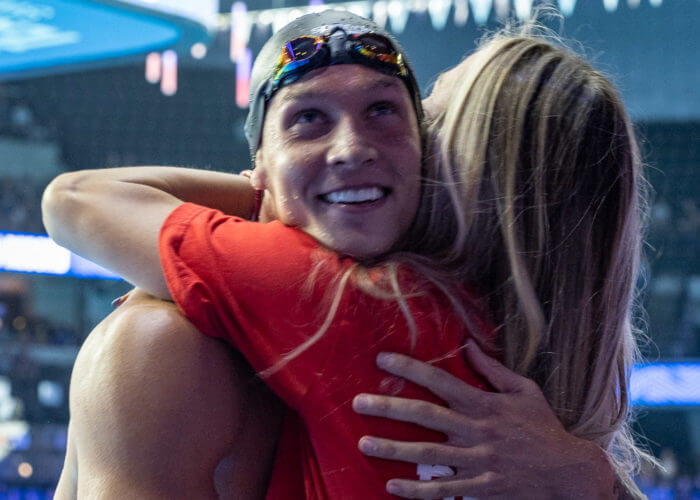
Caeleb Dressel — Photo Courtesy: Peter H. Bick
Dressel is the dominant swimmer in the world, and he has been ever since 2017, when he won a record-tying seven gold medals at the World Championships. He has won individual golds in the 50 freestyle, 100 freestyle and 100 butterfly at the last three major competitions: Worlds in 2017 and 2019 (he also won the 50 fly in 2019) and then the Tokyo Olympics, where he became just the third male swimmer after Phelps and Mark Spitz to win three or more individual golds in one Olympics. He has only appeared in two editions of the World Championships, but his 13 gold medals at that meet already rank him fourth in history behind Phelps, Ryan Lochte and Katie Ledecky. Dressel’s main 100 free rival Kyle Chalmers will miss Worlds, but he will still have to fend off challengers including Hungarian butterfly star Kristof Milak. Still, barring anything shocking in Greensboro, Dressel will be the No. 1 swimmer in the world heading into this year’s Worlds.
2. Ryan Murphy
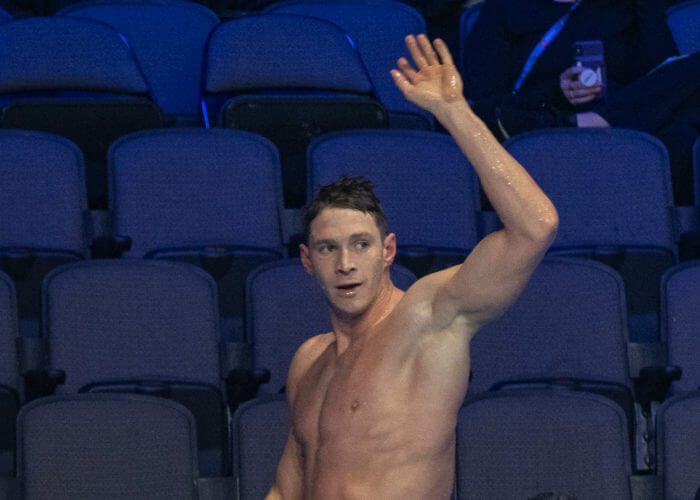
Ryan Murphy — Photo Courtesy: Peter H. Bick
It was a tough call for the second spot on this list, but the choice is Ryan Murphy, one of the world’s top backstrokers since he swept Olympic gold medals in the 100 and 200-meter distances at the 2016 Olympics. Murphy has not won an individual Olympic or world title since then, but he has been consistently on international podiums year after year while also providing the key leadoff leg for the U.S. men’s medley relay, which set a world record in winning Olympic gold in Tokyo. He will be heavily favored to win the 100 and 200 back at U.S. Trials, and if he does so, he would become the gold-medal favorite in both events for Worlds. None of the swimmers who beat Murphy in Tokyo (Evgeny Rylov in both events and Kliment Kolesnikov in the 100 back) will be in attendance because FINA banned all Russian athletes following the country’s invasion of Ukraine. So this year might be Murphy’s best shot to make a run at that elusive individual world title.
3. Bobby Finke
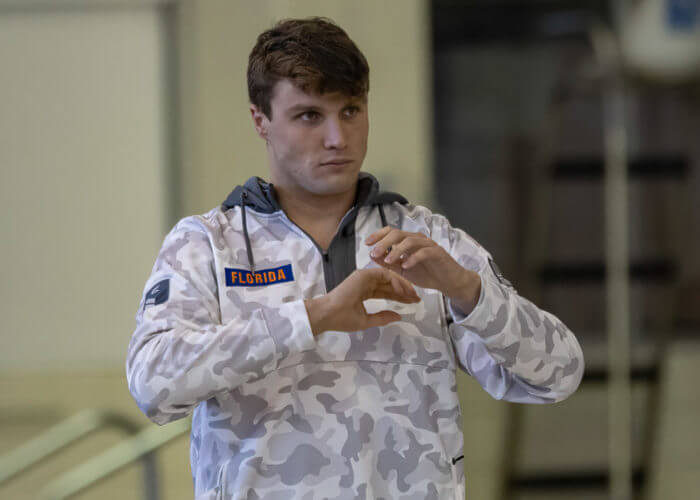
Bobby Finke — Photo Courtesy: Peter H. Bick
Bobby Finke could make an easy case for No. 2 since he was one of only three American swimmers (Dressel and Ledecky were the others) to win multiple individual gold medals in the pool in Tokyo. Finke pulled off stunning come-from-behind wins in the 800 freestyle and 1500 freestyle, becoming the first U.S. gold medalist in a men’s distance race since Mike O’Brien in 1984. More recently, Finke completed his college career with a dominating performance in the 1650-yard free at the NCAA Championships, a race he called “one of the sloppiest miles I’ve ever done.” The distance races are relatively thin for the United States behind Finke, so he will certainly be favored to win both at Trials, and depending on his event lineup, he could also be a factor in the 400 free and/or 400 IM. Expect Finke to once again go head-to-head with Florian Wellbrock, Mykhailo Romanchuk and Gregorio Paltrinieri for world titles in the 800 and 1500 in June.
4. Chase Kalisz
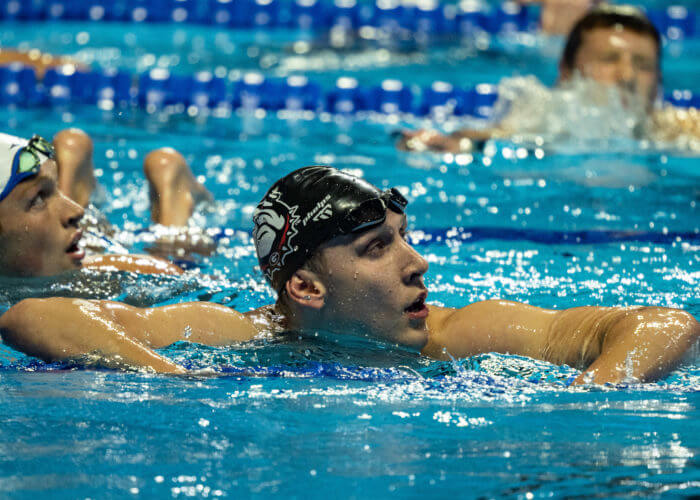
Chase Kalisz — Photo Courtesy: Peter H. Bick
In Tokyo, Chase Kalisz won the first gold medal in the pool and the first gold medal for the United States in any event as he captured the 400 IM title, leading a U.S. 1-2 finish with Georgia training partner Jay Litherland. Kalisz has previously won world titles in the 200 IM as well as his signature 400 IM. However, Kalisz is a bit of a wildcard heading into this year. He hinted last summer that he may move away from swimming the 400 IM in the future, and he has not raced the event in long course since Tokyo. He posted some solid swims at the most recent TYR Pro Swim Series in San Antonio, including a win in the 200 butterfly and third-place finishes in the 200 breaststroke and 200 IM, so it’s not clear what to expect from him in Greensboro. Of course, Kalisz was a wildcard last year entering Trials after a down year in 2019 when he was dealing with an injury (then undisclosed), and he ended up becoming an Olympic champion.
5. Kieran Smith
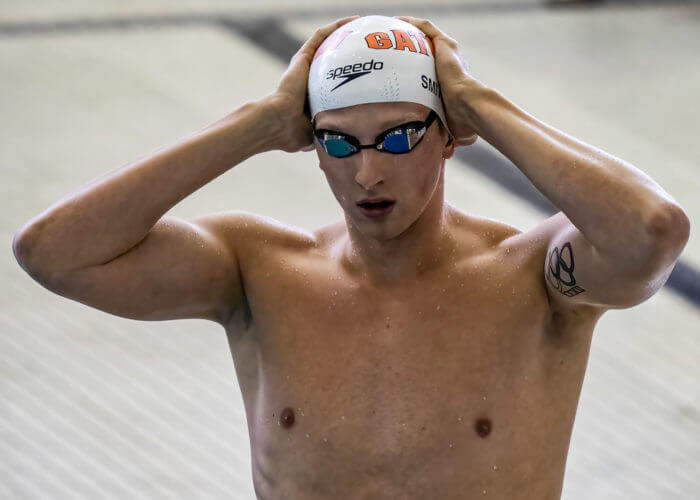
Kieran Smith — Photo Courtesy: Peter H. Bick
When Kieran Smith qualified for his first Olympic team last year in the 400 freestyle, he expressed confidence that he would be able to drop time and contend in the event in Tokyo. He was correct, and he ended up with an individual bronze medal for his efforts. He also qualified for the 200 free final in Tokyo, and he led off the U.S. men’s 800 free relay in 1:44.74, the quickest leadoff split in the field and good enough to make Smith the third-fastest American ever in the event. But Smith’s senior-year NCAA Championships did not go as planned as he finished fourth in the 500-yard , an event where he holds the fastest time in history, and fifth in the 200 free, where he was the defending champion. Smith did post a solid fourth-place performance in the 200 back, and he anchored Florida to a dramatic win in the 200 free relay, but he will need to channel the Olympics version of himself to return to international contention this year.
6. Michael Andrew
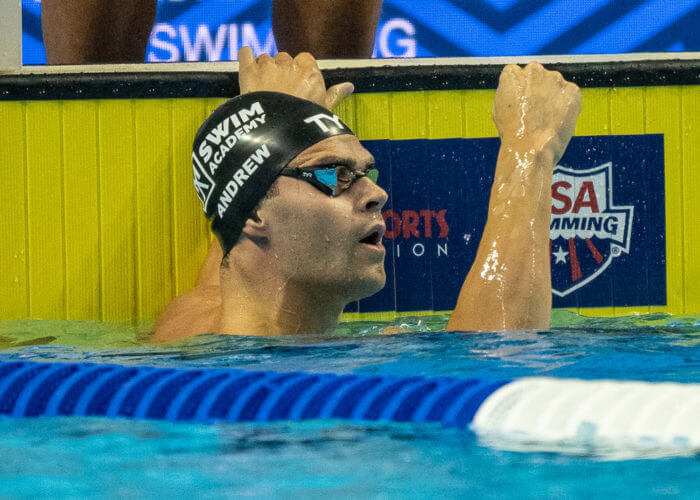
Michael Andrew — Photo Courtesy: Peter H. Bick
Michael Andrew’s first Olympics did not go as planned as he did not get on the podium for any of his individual events, but Andrew, who turns 23 on Monday, is now well-established on the international scene. Andrew was ranked first in the world in the 200 IM prior to the Olympics and third in the 100 breaststroke, but he ended up finishing fourth in the 100 breast before fading to fifth in the 200 IM, despite leading the race with 50 meters to go. The last 50 meters of the 200 IM has been a struggle for Andrew throughout his career, but he will have a lot of chances to make his mark in 2022 for the United States. He will likely swim all four 50-meter events at Trials, and in 2019, he became the first swimmer to qualify for the final in all four 50s. He was fourth in the 50 free at the Olympics, missing a medal by just three hundredths, and he finished his Games on a strong note as he swam the breaststroke leg of the world-record-setting 400 medley relay. We will see plenty of Andrew at Trials, and he will likely put himself in the mix for a variety of events at Worlds.
7. Nic Fink
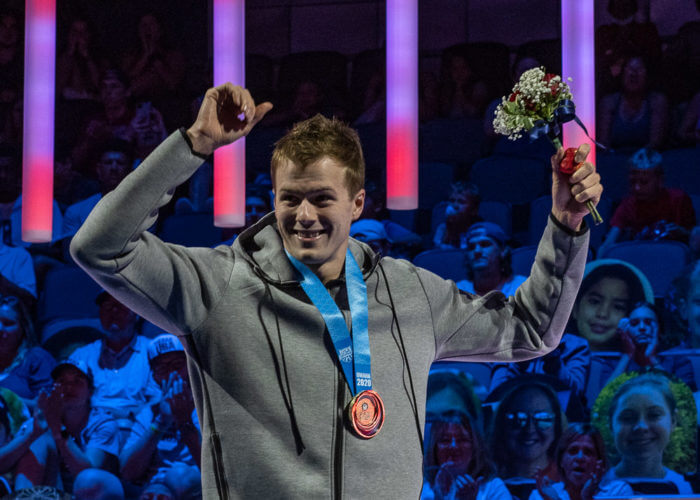
Nic Fink — Photo Courtesy: Peter H. Bick
Nic Fink had a huge year in 2021. After finishing third in an extremely close 100 breast final at Olympic Trials, he qualified for his first Olympic team by winning the 200 breaststroke, and after placing sixth in the Tokyo final, he produced a remarkable fall short course season on the ISL circuit. He won all three breaststroke events in the ISL final, upsetting Ilya Shymanovich on each occasion, and then he captured two individual gold medals (200 breast and 50 breast) at the Short Course World Championships. Fink swam those remarkable performances in the fall while he was beginning a graduate program at Georgia Tech for electrical and computer engineering, and the 28-year-old recently said told Swimming World that he’s not sure how much longer swimming will be a priority in his life. But for 2022, he remains the best U.S. hope in the 200 breast, and he has a solid chance of making the World Championships in the 100-meter distance as well.
8. Jay Litherland
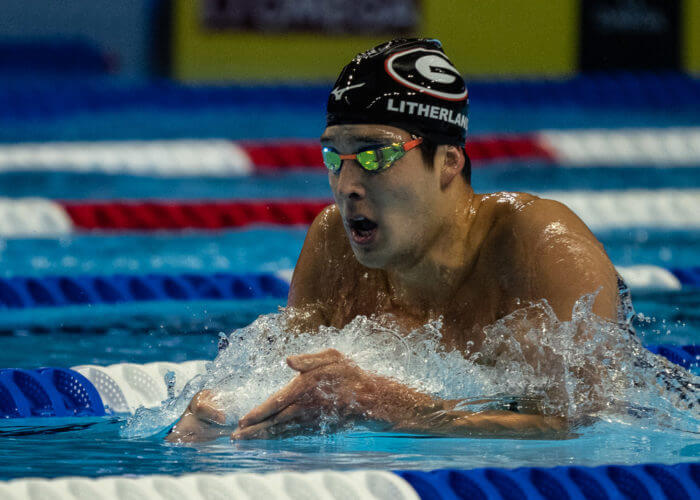
Jay Litherland — Photo Courtesy: Peter H. Bick
Jay Litherland is the final man on this list to have won an individual Olympic medal. The 400 IM is the only event in which Litherland is competitive internationally, but he is really good at it. The 26-year-old was the silver medalist in the event at the 2019 World Championships, and then he matched that finish at the Tokyo Olympics as he placed second behind teammate Chase Kalisz. Litherland has solid skills in all four strokes, but his final 100 meters are absolutely elite. He has earned his two Olympic berths by pulling stunning comebacks on the freestyle leg, passing Ryan Lochte in the Olympic Trials final in 2016 and then running down Carson Foster five years later. In Tokyo, Litherland was sixth with 100 meters to go before running down everyone except Kalisz to earn the silver medal.
9. Shaine Casas
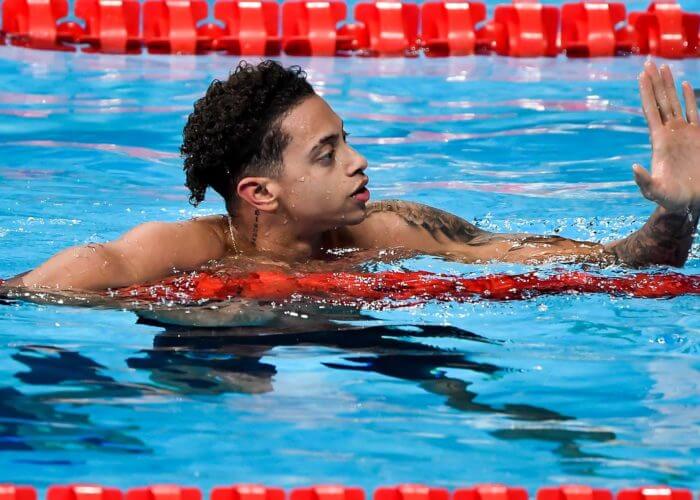
Shaine Casas — Photo Courtesy: Andrea Staccioli / Deepbluemedia / Insidefoto
After he captured three national titles at the 2021 NCAA Championships, Shaine Casas looked to be in position to qualify for his first Olympic team. He fell just short of that accomplishment at Olympic Trials, but he was brilliant in his international debut for the United States at the Short Course World Championships in December. Casas won the short course world title in the 100 backstroke, edging out Olympic bronze medalist Kliment Kolesnikov, and he also won silver in the 200 back and four relay medals. So far this year, Casas has posted the fastest time in the United States in the 100 butterfly (51.09) and 200 IM (1:56.70) as well as the second-quickest marks in the 100 back (53.28) and 200 back (1:58.09). Now training at the University of Texas, Casas will be a contender to qualify for the World Championships in all of those events along with possibly the 100 freestyle as a relay swimmer.
10. Zach Apple
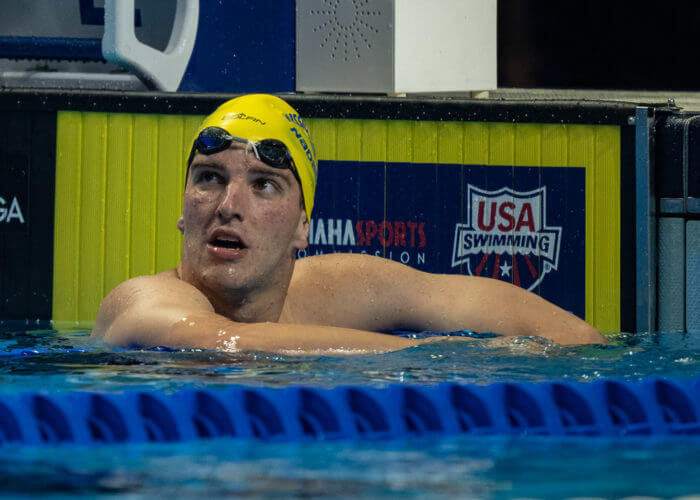
Zach Apple — Photo Courtesy: Peter H. Bick
In his first Olympic final, Zach Apple was thrust into the high-pressure spot as the anchor leg of the U.S. men’s 400 freestyle relay, and he delivered with a 46.69 split to secure American gold. However, two days later, Apple missed the individual final of the 100 free before swimming a disappointing split on the 800 free relay that ended up costing the American men a medal. However, he would bounce back to anchor another relay, the U.S. men’s 400 medley, to gold and a new world record. Apple has not posted any standout swims since Tokyo, but he has built a consistent track record of success in the 100 and 200 free over the past five years. He consistently qualifies for the biggest meets of the year and then performs, so it’s fair to expect Apple to be in that mix again in 2022.
11. Carson Foster
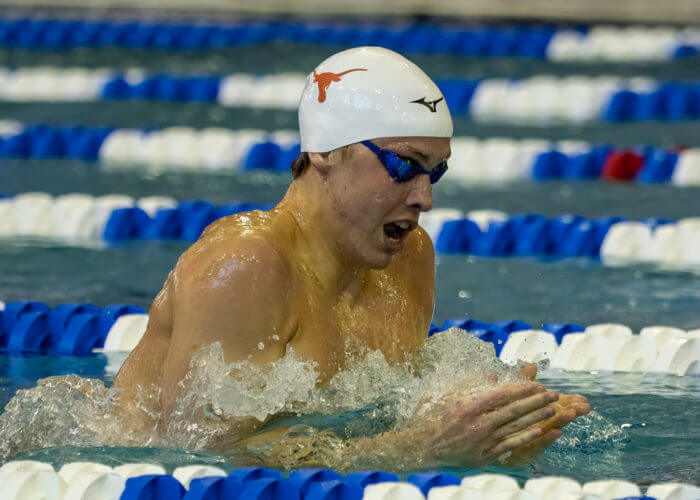
Carson Foster — Photo Courtesy: Peter H. Bick
Will this be the season that Carson Foster finally puts it all together? Following his freshman season at the University of Texas, Foster was the top qualifier for the 400 IM final at Olympic Trials, but he ended up finishing third behind Chase Kalisz and Jay Litherland, who went on to finish 1-2 in the event at the Olympics. He also narrowly missed the Olympic team in the 800 freestyle relay. A month later, Foster swam the fastest time in the world in the 400 IM, faster than the winning time at the Olympics, at a Sectionals meet in Austin. Foster made his senior debut for Team USA at the Short Course World Championships, where he won a silver medal in the 200 IM and a bronze in the 400 IM, and he appeared to be building toward a huge performance at the NCAA Championships. He posted some quick times in Atlanta, including a brilliant 3:33.79 in the 400-yard IM, but he was slower in the finals in all three of his events. Performing at his best in key moments remains has been challenging for Foster so far, although he is only 20 years old, with plenty of time to change that narrative. At Trials, he will again be a favorite to qualify for Worlds in the 400 IM and for relay duty in the 200 free, and should he perform to his potential, World Championship medals will definitely be a possibility.
12. Luca Urlando
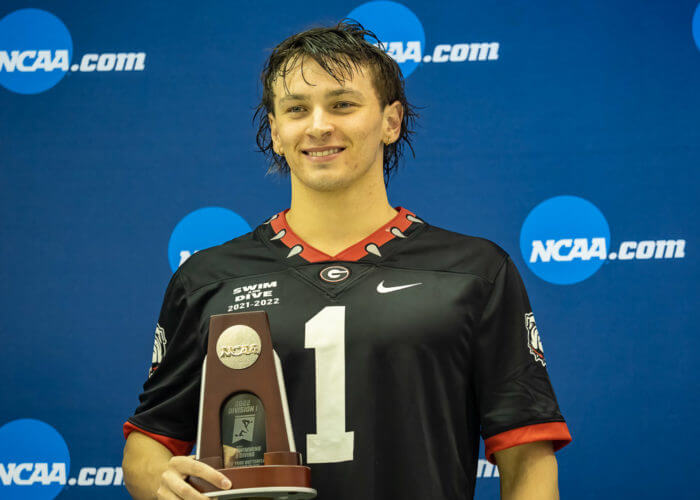
Luca Urlando — Photo Courtesy: Peter H. Bick
The newest American-record holder is 20-year-old Luca Urlando. Long known for his impressive skills in the butterfly events, Urlando used sensational underwaters to take down Ryan Murphy’s national mark in the 100-yard backstroke at the NCAA Championships last month. He also finished third in the 200 IM and second in both butterfly races on the college level. In long course, Urlando will have a very real chance to qualify for the World Championships in the 100 and 200 butterfly, both races in which he placed third at Olympic Trials last year, as well as in the 200 freestyle for relay duty. Urlando has been as quick as 1:53.84 in the 200 fly (in 2019), a performance which made him the third-fastest American ever. He has not approached that form in three years, but getting close would put him in the conversation for individual medals at Worlds.
13. Coleman Stewart
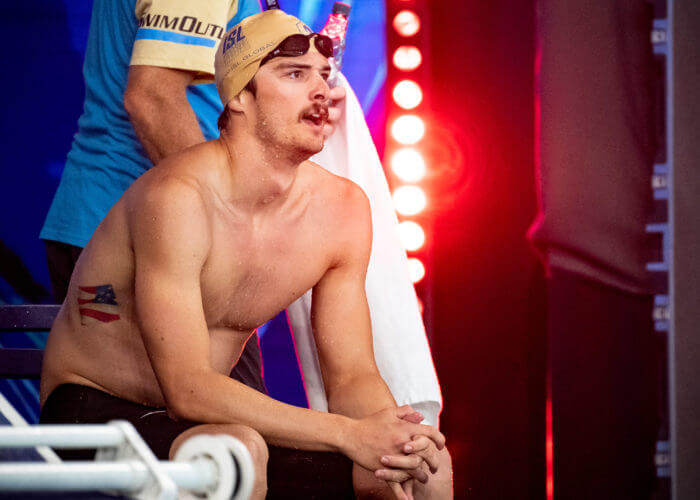
Coleman Stewart — Photo Courtesy: Giorgio Scala / Deepbluemedia / Insidefoto
Based on his career history, Coleman Stewart will have a tough time qualifying for the World Championships. He did earn spots in two finals at last year’s Olympic Trials, finishing tied for fourth in the 100 butterfly and eighth in the 100 freestyle, while he ended up 10th in the event considered his best, the 100 backstroke. Two months later, Stewart became a world-record holder as he swam a 48.33 in the short course 100 back during the second meet of the ISL season. Stewart has been a remarkable short course backstroker going back to his days as a standout at North Carolina State, but he has not been able to translate that into long course success. Still, a world record earned him a nod here, and if he can find a spot to have success in the 50-meter pool, Stewart would likely move up in the rankings.
14. Drew Kibler
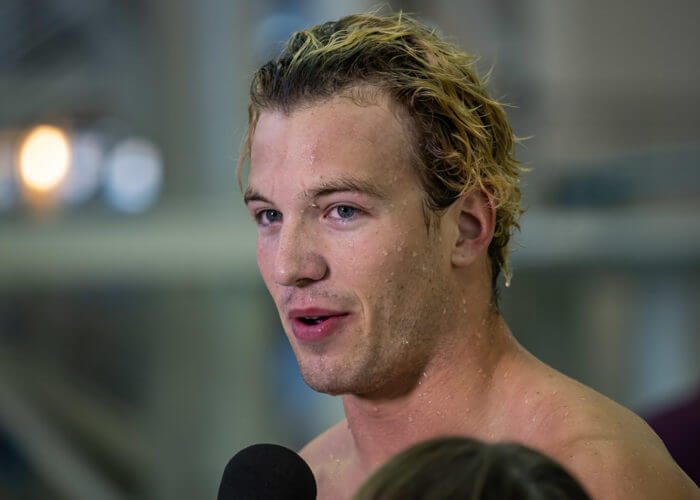
Drew Kibler — Photo Courtesy: Peter H. Bick
University of Texas standout Drew Kibler made the jump to long course last year when he qualified for his first Olympic team as the third-place finisher in the 200 freestyle at Trials. He ended up swimming the second leg of the American men’s 800 freestyle relay in Tokyo, and he recorded a 1:45.51 split that kept the United States in the lead, although the team ended up without a medal. He returned for his senior season at Texas and won his first individual NCAA title in the 200-yard freestyle, where Kibler swam a time of 1:30.28 to defeat a loaded field. Kibler returned to long course one week later and posted solid times in the 200 free (1:47.61) and 100 free (49.30) at the TYR Pro Swim Series in San Antonio to set himself up for Greensboro.
15. Brooks Curry
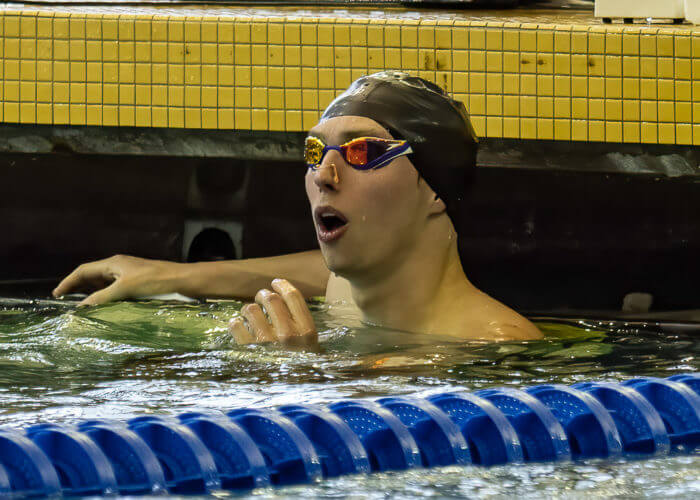
Brooks Curry — Photo Courtesy: Peter H. Bick
LSU’s Brooks Curry was a surprise qualifier to the 2021 Olympic team after placing fourth in the 100 freestyle at Olympic Trials, and he earned a gold medal as a prelims relay swimmer in Tokyo. He followed up that success with a brilliant college season, which included NCAA titles in the 50-yard free and 100 free, and if he can navigate the upcoming Trials, he will be set up to expand his presence on the U.S. team in 2022. Curry is 21, much younger than most of the other contenders in the sprint events for the U.S., and the Americans will definitely need some increased depth in the sprint events to maintain their recent hold over the 400 free relay, particularly with veteran Nathan Adrian not having competed since Olympic Trials and Blake Pieroni missing this year with injuries.
Others Considered
There will definitely be a chance for some new faces to make an impact on the U.S. men’s team this year with many veterans from the Tokyo team absent from this year’s Trials. Townley Haas and Andrew Seliskar have both retired, while Olympic finalist breaststroker Andrew Wilson has not competed since Tokyo. Veteran sprinter Ryan Held and breaststroker Will Licon will be among those looking to qualify for the Worlds team after narrowly missing the cut for the Olympics last year. Also worth watching are NCAA champions Destin Lasco (backstroke) and Max McHugh (breaststroke), but neither has shown long course skills that match their accomplishments in the 25-yard pool.





Ryan Held robbed after his SC worlds performance
What I find unsettling about this article is it states that it is about the top 15 who have a chance to medal at WC, then ranks a swimmer and says he’ll have a tough time even making the team….and it leaves out 2020 US Olympians who made the team in individual events in favor of relay-only qualifiers. Granted, everyone in here is an elite swimmer, but to leave out Harting & Shields completely, or Armstrong who was #5 in the world/100 back last season.???
I guess, why limit it to 15 then…just odd…
I’m disappointed no paraswimmers were listed.
There will be a Para swimmer top-15 ahead of the World Para Champs.